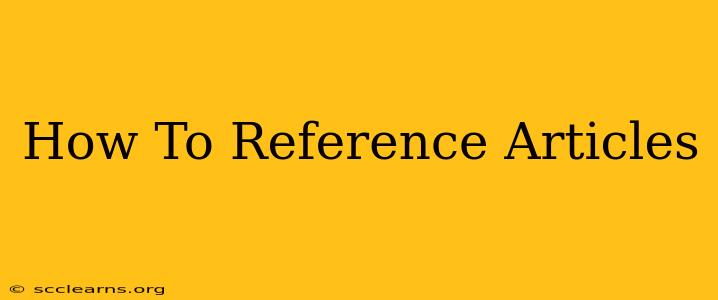Properly referencing articles is crucial for academic integrity and avoiding plagiarism. Whether you're writing an essay, a research paper, or a dissertation, understanding how to cite your sources correctly is essential. This guide will walk you through the process, covering different citation styles and offering practical tips to ensure accuracy and consistency.
Understanding the Importance of Referencing
Referencing articles serves several vital purposes:
- Giving Credit: It acknowledges the original authors and their intellectual property, avoiding plagiarism.
- Supporting Claims: It provides evidence to back up your arguments and strengthens your work's credibility.
- Enabling Verification: It allows readers to locate and verify the information you've presented.
- Demonstrating Research: It showcases the breadth and depth of your research, highlighting your understanding of the subject matter.
- Avoiding Legal Issues: Proper referencing protects you from potential copyright infringement and academic penalties.
Choosing a Citation Style
Different academic disciplines and institutions often prefer specific citation styles. Some of the most common include:
- MLA (Modern Language Association): Commonly used in humanities disciplines like literature, languages, and cultural studies.
- APA (American Psychological Association): Widely used in social sciences, psychology, education, and business.
- Chicago/Turabian: Offers both a notes-bibliography and author-date system, frequently used in history, art history, and some social sciences.
- IEEE (Institute of Electrical and Electronics Engineers): Primarily used in engineering, computer science, and technology fields.
It's crucial to check the specific requirements of your institution or assignment guidelines to determine the appropriate citation style.
Key Elements of a Reference
Regardless of the citation style you choose, most references will include these core components:
- Author(s): Last name, followed by first initial(s).
- Year of Publication: Usually in parentheses.
- Article Title: In quotation marks.
- Journal Title: Italicized.
- Volume Number: Usually in italics or bold.
- Issue Number: Sometimes included, depending on the style guide.
- Page Numbers: The range of pages the article occupies.
- DOI (Digital Object Identifier): A unique alphanumeric string that identifies the article online. This is highly preferred where available.
- URL (Uniform Resource Locator): If a DOI is not available, you may need to include the URL.
Example References in Different Styles
Let's illustrate how to reference a journal article using a few common styles. Assume the following details for our example article:
- Authors: Smith, John; Doe, Jane
- Year: 2023
- Article Title: "The Impact of Social Media on Adolescent Mental Health"
- Journal Title: Journal of Adolescent Psychology
- Volume: 15
- Issue: 2
- Pages: 75-92
- DOI: 10.1234/jap.12345
APA Style:
Smith, J., & Doe, J. (2023). The Impact of Social Media on Adolescent Mental Health. Journal of Adolescent Psychology, 15(2), 75-92. https://doi.org/10.1234/jap.12345
MLA Style:
Smith, John, and Jane Doe. "The Impact of Social Media on Adolescent Mental Health." Journal of Adolescent Psychology, vol. 15, no. 2, 2023, pp. 75-92, doi:10.1234/jap.12345.
Chicago/Turabian (Author-Date):
Smith, John, and Jane Doe. 2023. "The Impact of Social Media on Adolescent Mental Health." Journal of Adolescent Psychology 15 (2): 75-92. https://doi.org/10.1234/jap.12345
Tips for Accurate Referencing
- Use a Citation Management Tool: Tools like Zotero, Mendeley, or EndNote can significantly simplify the process and ensure consistency.
- Double-Check Your References: Carefully review each reference to ensure accuracy before submitting your work.
- Consult Style Guides: Refer to the official style guide for your chosen citation style for detailed instructions.
- Seek Help When Needed: Don't hesitate to ask your instructor, librarian, or writing center for assistance if you need clarification.
Mastering the art of referencing articles is a valuable skill that will benefit you throughout your academic career and beyond. By following these guidelines and utilizing the available resources, you can ensure your work is both accurate and ethically sound.

